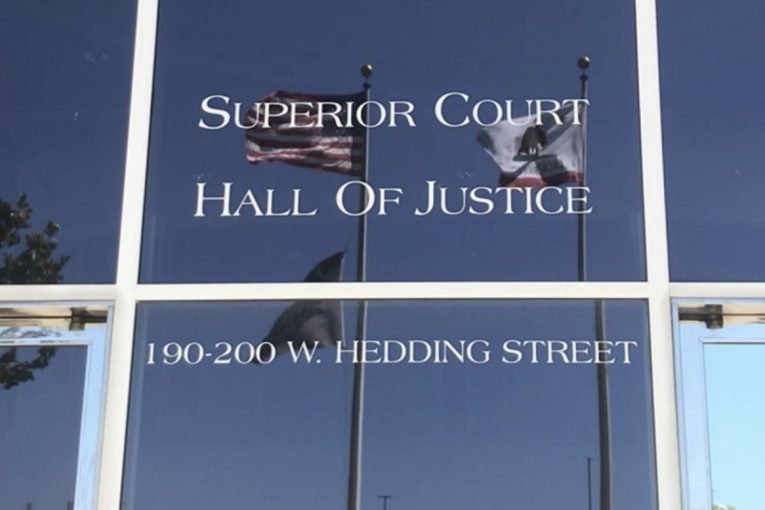
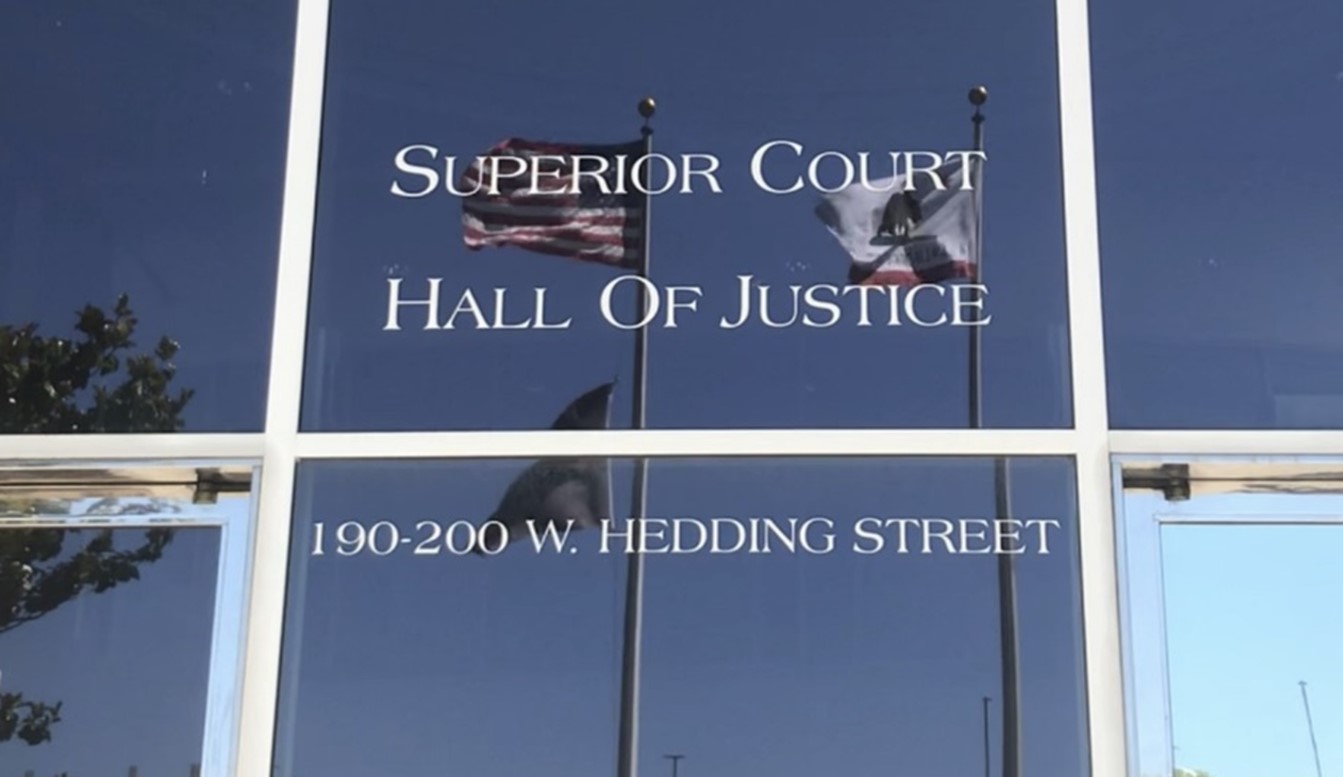
Editor’s note, the teen victim-witness in this story is identified as Emily Doe. The father charged with attempted murder of a family court reunification therapist is referred to only by his first name out of respect for his children, Aidan, and Faith. We are pleased to welcome Habri Ruggeri, who makes her debut as a contributor to the Vanguard’s reporting on California’s family courts.
By Habri Ruggeri, Susan Bassi and Fred Johnson
After nearly two years, an attempted murder case involving a family court reunification therapist was finally scheduled for a preliminary hearing to determine if the case would proceed to a jury trial. The Vanguard and several court watchdogs were anxious to view the proceedings using Microsoft  Teams, the court’s online remote public access service. However, an unusual chain of events occurred that suggested the judge assigned to the case wanted to keep the hearing from public access and media oversight.
Teams, the court’s online remote public access service. However, an unusual chain of events occurred that suggested the judge assigned to the case wanted to keep the hearing from public access and media oversight.
The case, which has sparked controversy due to its connection to two divorce cases and transgender minors counsel BJ Fadem, had garnered attention on social media. However, despite the ostensibly serious charges and the alleged use of a “ghost” gun, mainstream media outlets failed to report on either the criminal case, or the related family law matters.
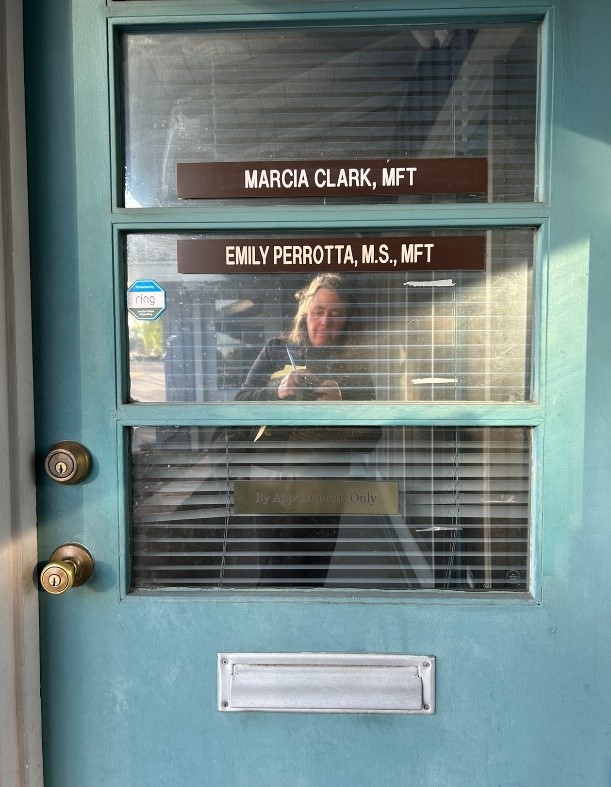
In the summer of 2022, family court reunification therapist Marcia Clark called the Campbell Police Department and reported that a father (Jeff) she had been counseling in connection with a divorce case was at her office with a gun. She claimed he threatened to kill her and a teen who, when Jeff arrived, was in session with Clark in connection with her own parents’ divorce.
When police responded and raised questions of possible motives, Clark stated she believed Jeff’s actions were a result of anger stemming from revelations made by attorney BJ Fadem, the court-appointed minors counsel in Jeff’s divorce, regarding his daughter Faith’s desire to transition gender during the prolonged divorce proceedings.
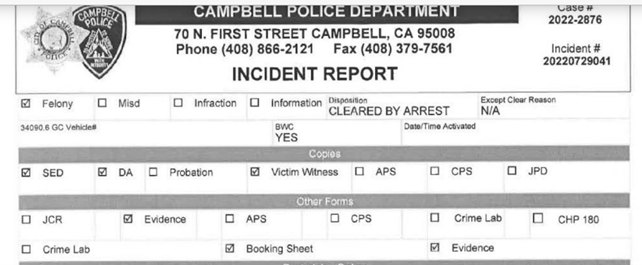
During his interview with police, Jeff said that he had arrived at Clark’s office early for a scheduled appointment and was desperate for Clark’s permission to talk to his son, whom, due to the contentious child custody dispute in his divorce, he had not had contact with for over two years.
In conflict with Clark’s suggested motive, Jeff did not complain to police about his child wanting to transition to a boy. In fact, Jeff had been seeing his daughter on a regular basis provided he paid Clark’s $300 per hour demanded fee.
Jeff repeatedly asserted to the police that he did not threaten Clark or the teen, Emily Doe, in Clark’s office that day and never intended to harm anyone. He repeatedly stated he was desperate to talk to his son and frequently referred to payments he owed Clark when speaking with police on July 29, 2022.
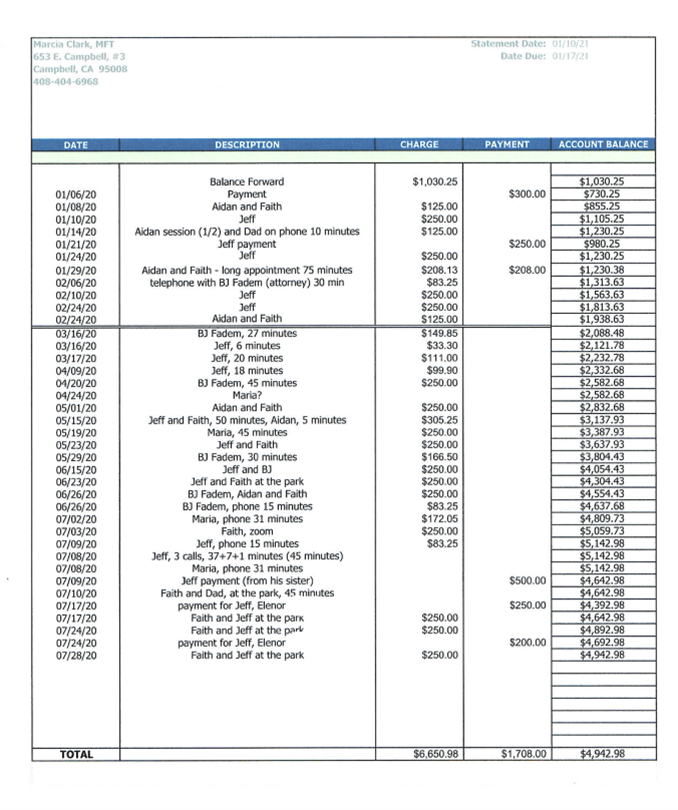
Emily Doe’s statements to Campbell police were in conflict with statements made by Clark with respect to attempted murder claims.
Nonetheless, Jeff has been sitting in the Santa Clara County Jail for nearly two years, awaiting his day in court, which reporters and court observers sought to observe over the remote court access system.
Vanished From Public View: Jeff’s Day in Court
On February 1, 2024 court observers logged on to view the long-awaited hearing where Clark was expected to testify. However, they were frustrated after Deputy District Attorney (DDA) Oliva Mendoza immediately requested that the matter be postponed until the following Monday. Santa Clara Superior Court Judge Cynthia Sevely granted Mendoza’s request.
After the hearing was rescheduled, the Vanguard made a written, formal request, seeking permission to remotely access and record the proceedings.
The main objective of the request was to ensure judge-approved remote access. In California, remote access to public court proceedings is not assured, and remote access policies are inconsistent, varying from county to county.

On February 5, Judge Sevely reconvened the criminal proceedings at 8:30 am, but neglected to issue a ruling on the Vanguard’s media access request. Once again, the judge announced the hearing would be delayed to 10 a.m. that same day. However, when Vanguard reporters remotely tuned in at 10 a.m., the hearing had vanished. Shortly thereafter, remote access lines to Judge Sevely’s courtroom were cut off.
Inquiries by the Vanguard to the court’s Public Information Officer (PIO) about the status of the hearing and pending media request went unanswered. Eventually, a Vanguard reporter physically went to the courthouse and discovered that the case had been moved to Judge Nahal Iravani-Sani’s courtroom, where remote access was also blocked.
The unusual chain of events, including unannounced, spontaneous courtroom and judge changes, implied that the court did not want the hearing observed by the public or media.
Vanguard Obtains Court Reporter Transcript of the Vanishing Court Hearing
There was no record as to how the criminal case moved to a new judge. Further, Clark did not testify based on Proposition 115, California’s crime victim law. Voters passed the law as an effort to minimize victims’ courtroom exposure in criminal cases. The law allows police officers to provide hearsay testimony in place of a victim-witness during a preliminary hearing.
Despite public defender Allison Gomez pointing out flaws in Clark’s statements to police related to Jeff’s threats to kill Clark and Emily Doe, Judge Iravani-Sani ordered the case to move forward to a jury trial.

Blocking Public and Press Remote Access to Family Court Hearings
During the 2020 pandemic Californians spent hundreds of thousands of dollars building a remote court access infrastructure that allowed attorneys, litigants, witnesses, and members of the public to remotely access public court proceedings. However, as the state’s health and safety laws related to COVID began to relax, courts across the state began to implement policies to restrict public and press access to court proceedings.
By way of example, the Vanguard recently submitted a media request for remote access to a divorce case hearing before Judge Christine Garcia-Sen. The case involved the custody disputes of Emily Doe’s parents.
According to court files, Emily Doe’s father claimed her mother, represented by Heather Allan, was not complying with custody orders despite years of therapy and payments to Clark. Also at issue was the request of Heather Allan for Judge Garcia-Sen to reappoint Nicole Ford as minors counsel for the nearly 18-year-old Emily Doe, the alleged witness-victim in the attempted murder case.
Ford had been minors counsel in the case until two months before the alleged attempted murder of Clark and Emily Doe in July of 2022.

Judge Garcia-Sen denied the Vanguard’s media request and blocked all access lines, preventing reporters and members of the public from accessing the public proceedings.
According to the minute order obtained by the Vanguard, Clark testified at the hearing, but the judge elected not to appoint Ford as minors counsel.
Remote Public Courtroom Access in California vs. Nevada:
Remote access to public proceedings is not guaranteed in California. Despite remote access being the primary means of court access during the pandemic, Los Angeles County Superior Court terminated remote access following leaked audio from hearings in the Britney Spears conservatorship case. A leak that fueled the Free Britney Movement and related social media frenzy.
A legal challenge to the LA Superior Court policies was undertaken by USA Today. The news outlet argued that the economic realities of the modern free press made it difficult to have reporters physically covering courthouses when remote access was available. The challenge taken to the California Supreme Court was denied in 2021.

In Contra Costa and Stanislaus Counties, court watchdogs found remote access to public court proceedings available. Stanislaus broadcasts criminal proceedings live on YouTube.
In San Mateo County, remote access to family court proceedings were blocked after observers and reporters sought access to proceedings involving reunification camps.
In Santa Clara County, court spokesperson, Lisa Herrick, told the Vanguard that judges are given the ability to decide who can access their courtrooms remotely.
In stark contrast to California policies related to public court access, Neveda permitted remote access and recording.
The value of openness of public court proceedings lies in the fact that people not actually attending trials can have confidence that the standards of fairness are being observed with the knowledge that anyone is free to attend – Neveda Supreme Court February 15, 2024
However, in the summer of 2022, Nevada ceased public recordings of family law cases and implemented court rules that allowed family law cases to be sealed from public view at the request of one party.

YouTube Reporter Gets Big Win, Opening Up Family Courtrooms to the Public and Press
Following his own family court experience in Neveda, Alexander M. Falconi started the YouTube channel, Our Nevada Judges. After his media request in a family law case was denied due to court rules, Falconi challenged the rules at the Nevada Supreme Court. He was supported by the Legal Aid Center of Southern Nevada and the Academy of Matrimonial Lawyers Committee.
In his challenge to Nevada’s highest court, Falconi argued that the public and press have a constitutional right to access family court proceedings and that the 2022 rules obstruct public access.
The Nevada Supreme Court agreed with Falconi, recognizing him as a press organization and emphasizing the importance of public access to court proceedings.
In the published decision the court noted, civil proceedings are presumptively open.
“We take this opportunity to expand our discussion in Stephens Media, which concluded that there is a right to access criminal proceedings and hold that right to access applies in civil proceedings, including family law proceedings.”
Neveda Supreme Court justices noted their decision was grounded in both history and logic, referencing the tradition of open court proceedings that can be traced back to sixteenth century English common law.
The decision was additionally peppered with reference to newspapers that have historically fought for transparency and public access to court proceedings. In its 29-page ruling, the Neveda Supreme Court specifically noted that the value of openness lies in the fact that people not actually attending trials have confidence that the standards of fairness are being observed with the knowledge that anyone is free to attend public court proceedings.
Arguably, attending public court proceedings should apply to both walking through courtroom doors or signing in electronically to remote access lines that have been publicly funded with the intent of providing public access to open court proceedings.
